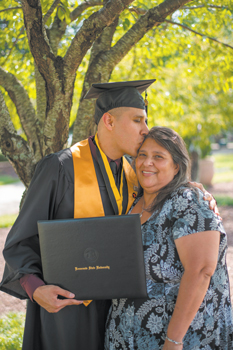 ’Tis the season.
’Tis the season.
Not the season of Santa Claus but of something far better for many of us — graduation from high school, college and beyond. These are occasions of pride in accomplishments, high expectations for the future and both individual and family celebrations. They bring moments of relief at what has passed, and hopes for the future, with nagging touches of anxiety thrown in as well. They are gifts to ourselves for the rest of our lives. In short, graduations are both rites of passage and life markers.
More than ever, nontraditional students are walking in caps and gowns in graduation processions. They are generally older people who, for whatever reasons, did not complete their educations, and people returning to school for additional degrees and certifications. For the most part, though, graduates are young people just dipping their toes in the real world of careers and adult relationships. Their lives are ahead of them, and it is traditional that graduations come with advice from family, teachers and commencement speakers who have labored hard to come up with original thoughts.
My graduations are long behind me, but I do remember some of the advice I received that has served me well over the decades — both in work and in personal life.
Education is the key to self-sufficiency. If you are lucky, you will find a partner with whom to pool your earthly resources, but make sure you can support yourself. There is nothing in life like your own paycheck.
Get to know yourself, trust yourself and enjoy your own company. Even with a large family and a wide circle of friends, the truth is that no one — not your parents, your siblings, your partner or your friends — will take every step of life with you. You will be happier and more successful if you appreciate yourself and your abilities.
You may wind up not working in the fields you studied in school, but your education will enrich your life in other ways. It has almost certainly sparked your curiosity about the world and taught you how to find out what you want to know about it, which will be a blessing all your life.
Outstanding commencement speakers are much in demand, of course, and chief justice of the United States Supreme Court is a rarified office indeed. Our nation has had 45 presidents, including the current White House occupant, who with one exception were eligible for one or two terms. Our chief justice, on the other hand, is appointed for life or until he or she resigns, and only 17 men have served in that capacity. John Roberts, our current chief, is 13 years into his tenure, and unlike our president, he is a deliberate man who chooses his words carefully and delivers them calmly.
Roberts has surely made more than a few commencement addresses, and The Atlantic recently reported on one of them. Two years ago, Roberts addressed his son’s ninth-grade class of all boys at a private school in New Hampshire. The chief skipped the traditional “congratulations and good luck” route and gave the boys his thoughts about how to behave as an American, particularly an American of privilege and as a citizen of the world.
Said Roberts, “I hope you will be treated unfairly, so that you will come to know the value of justice.” And, this. “I hope you’ll be ignored, so you know the importance of listening to others.” He continued. “Understand that your success is not completely deserved, and that the failure of others is not completely deserved either.”
And, finally, Roberts acknowledged the privilege of the boys, including his own son, and told them they were good boys and left them with this. “You are also privileged young men. And if you weren’t privileged before you came here, you’re privileged now because you have been here. My advice is, don’t act like it.”
Godspeed to all graduating this season, and I wish you a speaker as wise as our chief justice.